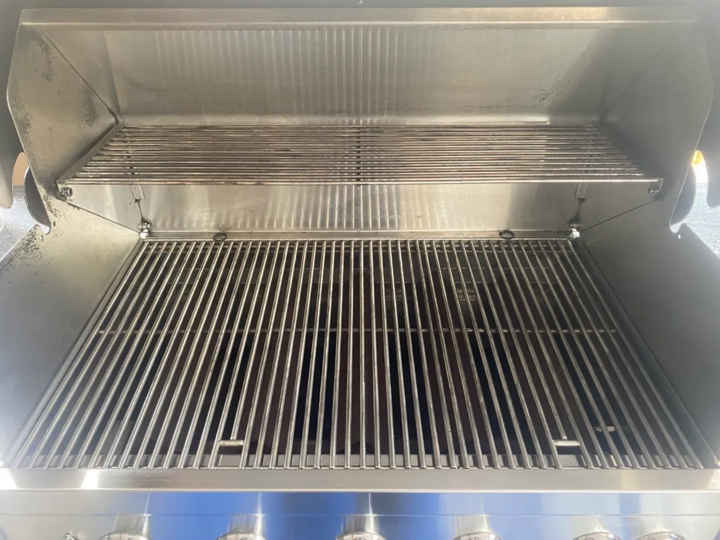How BBQ Cleaning Services Handle Different Grill Types?

Barbecue season is a favorite time for many, with outdoor grilling being a popular pastime that brings families and friends together. However, while grilling may be a delightful experience, cleaning the BBQ grill afterward is often seen as a dreaded chore. This is where professional BBQ cleaning services come in, providing a valuable solution for grill enthusiasts and home cooks alike. These services specialize in handling different types of grills, each requiring specific cleaning methods and care to ensure optimal performance and longevity.
Importance of BBQ Cleaning Services
Barbecue grills accumulate a lot of grime, grease, and food particles with each use. Over time, this buildup can lead to poor grill performance, cause flare-ups, and even create health hazards due to the harboring of bacteria. Regular cleaning is crucial to maintain the efficiency and safety of your grill. While some grill owners may opt for DIY cleaning methods, professional BBQ cleaning services offer a far more thorough and efficient process. These services not only remove surface dirt but also address the deep-seated grime that can affect your grill’s functionality and taste.
Professional BBQ cleaning services ensure that your grill is cleaned with the right techniques and tools suitable for its type. This ensures that no damage is caused during the process, preserving the life of the grill and ensuring optimal cooking results.
Different Grill Types and Their Characteristics
Each grill type requires unique cleaning techniques due to its design, materials, and cooking methods. Here’s a look at the most common types of grills and how professional cleaning services tackle them.
Gas Grills
Gas grills are highly popular for their convenience and ease of use. They use propane or natural gas and are known for providing consistent heat. However, gas grills can accumulate grease and carbon buildup over time, particularly around the burners, heat shields, and grates. If left unchecked, this buildup can hinder performance and cause dangerous flare-ups.
Key Challenges
- Burner blockage due to grease buildup.
- Accumulation of soot and carbon.
- Corrosion of metal parts due to improper cleaning.
Professional BBQ cleaners know how to disassemble gas grills, clean each component individually, and ensure that the burners and ignition systems are working properly after the cleaning process.
Charcoal Grills
Charcoal grills are loved for the smoky flavor they impart to food, but they tend to be messier than gas grills due to the ash and char residue. These grills require regular cleaning to remove the buildup of ash, grease, and carbon that accumulates over repeated uses.
Key Challenges
- Ash and grease buildup at the bottom of the grill.
- Stubborn food particles stuck to the grates.
- Rust formation if not maintained properly.
BBQ cleaning services often use high-powered tools and specialized brushes to clean charcoal grills, ensuring that all residue is removed without damaging the grill’s body.
Electric Grills
Electric grills are convenient for indoor or small-space grilling. While they don’t accumulate as much grease as other grills, their heating elements and drip pans can still get dirty. The key to maintaining electric grills is careful cleaning of the heating element without damaging the electrical components.
Key Challenges
- Drip pans often collect a lot of grease and grime.
- Heating elements must be cleaned carefully to avoid damage.
- Smaller surface area may lead to faster buildup of grease.
Professional cleaning services will often remove and thoroughly clean the drip pans and use gentle but effective methods to clean the heating elements without risking damage.
Pellet Grills
Pellet grills use wood pellets as fuel and are praised for the rich, smoky flavor they add to food. However, the pellet hopper, fire pot, and grates require consistent maintenance to avoid performance issues. Ash and grease buildup in these grills can quickly affect their operation.
Key Challenges
- Regular ash and grease buildup in the fire pot.
- Maintaining the pellet hopper to prevent blockages.
- Ensuring proper airflow for consistent heating.
Cleaning services ensure that the fire pot is thoroughly cleaned, the pellet hopper is free of debris, and the grill is functioning correctly after cleaning.
Kamado Grills
Kamado grills are ceramic, egg-shaped grills that can reach very high temperatures. These grills offer excellent heat retention and are used for grilling, smoking, and baking. Due to their unique design and ceramic build, Kamado grills require careful handling during cleaning to avoid damaging the ceramic material.
Key Challenges
- Char buildup can be difficult to remove from ceramic surfaces.
- Ash buildup can hinder airflow, affecting temperature control.
- The grill must be cleaned without damaging the ceramic.
Professionals use non-abrasive tools and techniques to clean Kamado grills, ensuring that no harm comes to the ceramic body during the process.
BBQ Cleaning Process: Step by Step
Each type of grill requires a tailored cleaning approach to ensure its functionality is restored and maintained. Here’s how professional BBQ cleaning services handle each type of grill:
Gas Grills: Cleaning Process
- Disassembling the Grill: The burners, heat plates, and grates are removed for thorough cleaning.
- Burner Cleaning: Burners are carefully scrubbed to remove any blockages.
- Grate Cleaning: The grates are soaked and scrubbed to remove built-up grease and carbon.
- Cleaning the Interior: The inside of the grill is cleaned to remove grease and food particles.
- Reassembling: Once everything is cleaned, the grill is reassembled and tested to ensure it’s working correctly.
Charcoal Grills: Cleaning Process
- Ash Removal: All ash is removed from the grill’s bottom.
- Grate Scrubbing: Grates are cleaned to remove stuck-on food particles.
- Interior Cleaning: The inside walls of the grill are scrubbed clean of carbon and grease.
- Reassembling: After thorough cleaning, the grill is reassembled and ready for use.
Electric Grills: Cleaning Process
- Unplugging and Disassembling: For safety, the grill is unplugged, and the grates and drip pans are removed.
- Cleaning Grates and Drip Pans: These components are cleaned separately.
- Wiping Down the Heating Element: A gentle cleaning solution is used to wipe down the heating element.
- Reassembling: After everything is cleaned, the grill is reassembled and tested.
Pellet Grills: Cleaning Process
- Ash Removal: The fire pot is cleaned to remove ash buildup.
- Cleaning the Pellet Hopper: Ensuring the pellet hopper is free of blockages.
- Grate Cleaning: Grates are soaked and scrubbed.
- Reassembling: Once cleaned, the grill is reassembled and tested.
Kamado Grills: Cleaning Process
- Ash Removal: Ash is carefully removed from the bottom of the grill.
- Cleaning the Grates: Grates are cleaned to remove food particles.
- Non-Abrasive Scrubbing: The ceramic surfaces are cleaned using non-abrasive tools.
- Reassembling: The grill is reassembled and checked for proper airflow.
Common Challenges Faced in BBQ Cleaning
BBQ cleaning services often encounter challenges specific to each grill type. Some of these include:
- Stubborn Grease and Carbon Buildup: Some grills accumulate layers of grease and carbon that are hard to remove without professional tools and chemicals.
- Blocked Burners in Gas Grills: Grease and carbon can block burners, affecting the heat distribution.
- Delicate Parts in Electric Grills: Electric grills require careful cleaning of heating elements to avoid damage.
- Rust and Corrosion: If grills are not cleaned regularly, rust can develop, requiring more extensive restoration efforts.
Why DIY BBQ Cleaning Often Falls Short?
Many grill owners attempt to clean their grills themselves, only to find that they are unable to remove stubborn grease or restore the grill to its original condition. DIY methods often lack the specialized tools and expertise needed to thoroughly clean a grill without damaging it. Furthermore, improper cleaning can lead to issues such as:
- Damaged Grill Parts: Harsh chemicals or improper cleaning techniques can damage delicate grill components.
- Incomplete Cleaning: DIY methods may not remove all grease and bacteria, leading to health hazards.
- Time-Consuming: Cleaning a grill thoroughly can take hours, especially without the right tools and experience.
Benefits of Professional BBQ Cleaning
There are numerous benefits to hiring a professional BBQ cleaning service, including:
- Deep Cleaning: Professionals have the tools and expertise to remove deep-seated grease and grime.
- Extended Grill Life: Regular professional cleaning can extend the life of your grill by preventing rust and corrosion.
- Improved Performance: A clean grill performs better, with more even heating and fewer flare-ups.
- Time-Saving: Professional cleaning saves you the time and hassle of doing it yourself.
How to Choose the Right BBQ Cleaning Service?
When selecting a BBQ cleaning service, consider the following:
- Experience: Choose a company with experience in cleaning the type of grill you own.
- Reputation: Look for reviews and testimonials to ensure the service is reliable.
- Methods: Ensure that the company uses eco-friendly, non-toxic cleaning products.
- Pricing: Compare pricing but remember that cheaper isn’t always better when it comes to professional services.
Conclusion
Grilling is a beloved activity, but maintaining your grill is essential to ensure it performs optimally and lasts for years. BBQ cleaning services are equipped to handle different grill types, using specialized techniques to ensure each grill is cleaned thoroughly without damage. Whether you own a gas grill, charcoal grill, electric grill, pellet grill, or Kamado grill, professional cleaning services can enhance your grilling experience by ensuring your equipment is in top condition. Don’t wait until your grill shows signs of wear and tear—regular cleaning can make all the difference!
FAQs on BBQ Cleaning
How often should I clean my grill?
It’s recommended to clean your grill after every use and have a professional deep clean at least once a year.
Can I use oven cleaner to clean my grill?
No, oven cleaners are too harsh and can damage your grill’s components.
How long does a professional BBQ cleaning take?
Depending on the grill type and condition, it can take between 1-3 hours.
Do BBQ cleaning services clean all types of grills?
Yes, most professional services clean gas, charcoal, electric, pellet, and Kamado grills.
Is it necessary to disassemble the grill for cleaning?
For thorough cleaning, professionals often disassemble parts like grates and burners.
Will professional cleaning remove rust?
Light rust can be removed, but severe rust may require part replacement.
Are the cleaning products used safe for food?
Yes, professional services use non-toxic, food-safe cleaning products.
Can I use a wire brush to clean my grill?
Be cautious with wire brushes, as loose bristles can get stuck on the grill and end up in your food.
Does professional cleaning improve the taste of food?
Yes, removing grease and charred food particles enhances the flavor of your food.
Can I clean the burners myself?
Cleaning burners requires care; professionals are better equipped to do it safely.
How do I prevent grease buildup on my grill?
Regular cleaning after each use helps prevent grease buildup.
Do BBQ cleaning services repair grills?
Some services offer minor repairs, but major issues require a dedicated repair service.
How can I tell if my grill needs a professional cleaning?
If your grill is smoking excessively, has uneven heat, or smells foul, it’s time for a professional cleaning.
Can professional cleaning remove bacteria from my grill?
Yes, professional cleaning eliminates harmful bacteria by thoroughly sanitizing the grill.
Are BBQ cleaning services expensive?
Prices vary, but the cost of professional cleaning is often worth it to ensure safety and performance.

